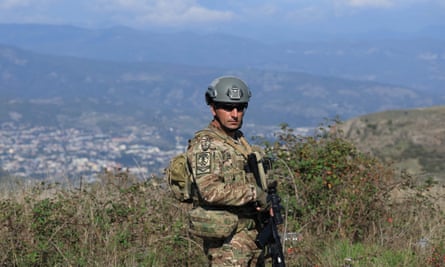Azerbaijani officials have said the country could be closing in on a peace agreement with Armenia to end their decades-long conflict following its lightning offensive in September to take control of its Nagorno-Karabakh region.
In face of a decisive military advance, more than 100,000 people fled the mountainous south Caucasus enclave, which, following a war in the 1990s, had been under the control of ethnic Armenian forces, backed by Armenia.
The show of force left the region largely deserted, leading the Armenian prime minister, Nikol Pashinyan, to allege the advance was an act of ethnic cleansing, which Azerbaijan denied. It was followed by the two countries speeding up talks on a peace agreement to stabilise relations and recognise one another’s borders.
In a rare sign of good will, the two sides swapped prisoners of war on 13 December and have issued a joint statement, one of the first not to be mediated by a third party.
The Azerbaijani president, Ilham Aliyev, met Pashinyan on 26 December for bilateral talks in St Petersburg, the first such encounter between the two leaders since the mass exodus. Little has emerged from the meeting so far.
The two sides have now exchanged seven drafts of a potential relatively short peace agreement. Elchin Amirbayov, the special ambassador to the Azerbaijani president, said the country is now waiting for Armenia’s response to its comments on the latest draft proposals.
“What is important to understand is that at this crucial stage in negotiations, where apparently we’re not that much far away from the final agreement, [is that] we do need a result-oriented exercise,” he said. “I know that that after three decades of negotiations and without no major result, there is a certain kind of fatigue and also frustration in both parties for how long we will continue just to see to meet each other without any reasonable results.”
Nagorno-Karabakh has been internationally recognised as Azerbaijani territory, but efforts to end the conflict have been complicated by Turkey, Russia, Iran, US and the EU all jostling for diplomatic influence in a strategically critical area. Russia has a significant military presence in Armenia. The area is of geostrategic importance due to the proposed “middle corridor”, the transport corridor that would link China to Europe through central Asia, the Caspian Sea and the south Caucasus.
Amirbayov said the five principles in the draft agreement are “mutual respect for each other’s territorial integrity, sovereignty and inviolability of international recognised borders, rejection of any territorial claims to each other, now and in the future, rejection of any acts that would run counter to UN charter, like the use of force or threat of use of force, but also delimitation of the border between Armenia and Azerbaijan, which has never been done. And, last but not least, opening of communication routes and ties between Armenia and Azerbaijan, because we’ve been without any connection because of the conflict for 30 years.”
In practice the issue of the border demarcation might be settled at a later stage since the negotiations are deemed so complex.
Azerbaijan also wants some kind of dispute mechanism for the agreement. “Our preference would be to have peace agreements. An article which would speak about some kind of bilateral commission, which needs to be set up in order to address all those misunderstandings or differences in interpretations between us,”
One of the unresolved issues is the link between the main part of Azerbaijan and its exclave of Nakhichevan. As part of a ceasefire agreement signed in November 2020 following a previous flare-up between the two countries, Pashinyan agreed to open a land transportation link through Armenian territory probably along an old Soviet rail track between the main part of Azerbaijan and Nakhichevan.
“The linkage between Azerbaijan and Nakhichevan between two parts of Azerbaijan is crucial for us, in terms of national security, but also in terms of ensuring alternative route for the middle corridor,” Amirbayov said. “We cannot waste any more time. After three years Armenia has not even started a feasibility study for the 42km leg.
after newsletter promotion
“Of course, we cannot force Armenia to implement what they had committed to, and it is nonsensical to suggest we would invade to impose this corridor through force or such like. So we have reached out to Iran as a plan B to build a link by road and rail through Iran.”
He said if it is possible the existence of the alternative route might make Armenia to realise how much they may lose by continuing to resist the link going through its land.
Much could yet go wrong. On 26 September the leader of Armenian separatists in Karabakh rescinded his own previous decree ordering the dissolution of separatist institutions on 1 January, and marking the end of the three decade separatist rule.

Displaced ethnic Armenian separatists have now spoken of forming a government in exile and Azerbaijan is insisting that if ethnic Armenians displaced in September are to have a right of return then those Azerbaijanis previously evicted from their homes in Karabakh should have their rights recognised.
In addition, Russia, the previous guarantor, is trying to regain influence, which waned when it did not intervene to help Armenia on the day of the decisive 19 September assault, as it had done in previous military assaults by Turkey-backed Azerbaijan.
Russia regards Pashinyan as too pro-European, particularly after he refused to participate in some recent meetings of the Russian-led regional bodies. But Russia has not abandoned its role, and it was significant that the two leaders met on Russian soil given the large number of countries offering themselves as mediators.

